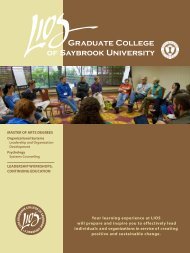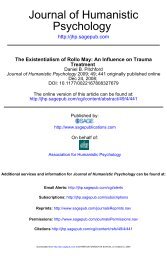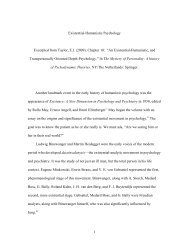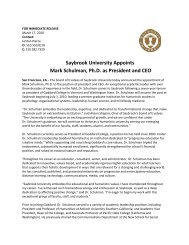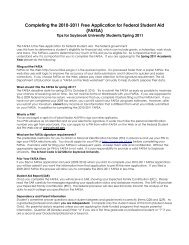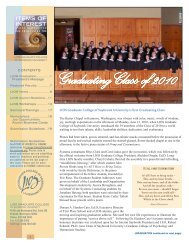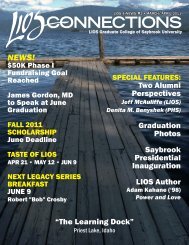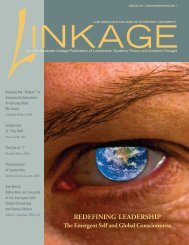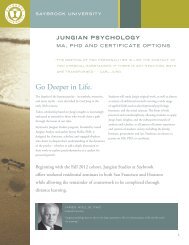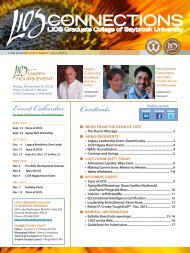Appendix F - Saybrook University
Appendix F - Saybrook University
Appendix F - Saybrook University
Create successful ePaper yourself
Turn your PDF publications into a flip-book with our unique Google optimized e-Paper software.
for Academic Writing 0700. Enrollment can be by student's<br />
choice, required at admission, or recommended to the student by<br />
content course instructors at any time during the program.<br />
Students may take up to 3 credits of Academic Writing over the<br />
duration of their program at <strong>Saybrook</strong>. Enrollments beyond the<br />
3-credit limit will be on a non-credit basis only. 0.0 credits.<br />
ALL 1035<br />
ALL 3040<br />
Critical Thinking for Psychologists<br />
This course is intended to help students think, read, write and<br />
practice with critical acumen about key issues in clinical psychology's<br />
theory, research, training and practice. The field's fundamental<br />
assumptions and their implications will be examined. A<br />
set of vital, current controversies will be addressed, including the<br />
medical model; psychodiagnostic categories and processes; theories<br />
of personality and change; manualized, outcome-based psychotherapy;<br />
etc. Students are encouraged to consider in greater<br />
depth the evidence and arguments marshaled for various positions,<br />
and to examine, refine or revise their own conclusions. 3.0<br />
credits.<br />
Models of Consciousness<br />
This course will explore the process of model building in psychology<br />
and human science by examining a spectrum of current<br />
models which dominate the study of consciousness, including<br />
those from cognitive neuroscience, the classical depth psychologies<br />
of Freudian psychoanalysis, humanistic and transpersonal<br />
approaches, Jungian psychology, and a selection of conceptions<br />
from the classical psychologies of Asia. How to identify the logic,<br />
metaphysics, epistemology, ontology, and cosmology of a given<br />
model will be a primary focus. What relevance these models of<br />
consciousness have for humanistic and transpersonal psychology<br />
and for human science will also be of concern. Because individuals<br />
often attempt their own integration, based on some fusion of<br />
theoretical readings, empirical scientific research, personal proclivities,<br />
and phenomenological goodness of fit with their own<br />
intuitive norms from experience, the synthesis of a more adequate<br />
model of consciousness for the student's own purposes will<br />
be encouraged. Prerequisite: Psychology of Consciousness,<br />
Humanistic Psychology, or Transpersonal Psychology or by permission<br />
of the instructor. 3.0 credits.<br />
238



